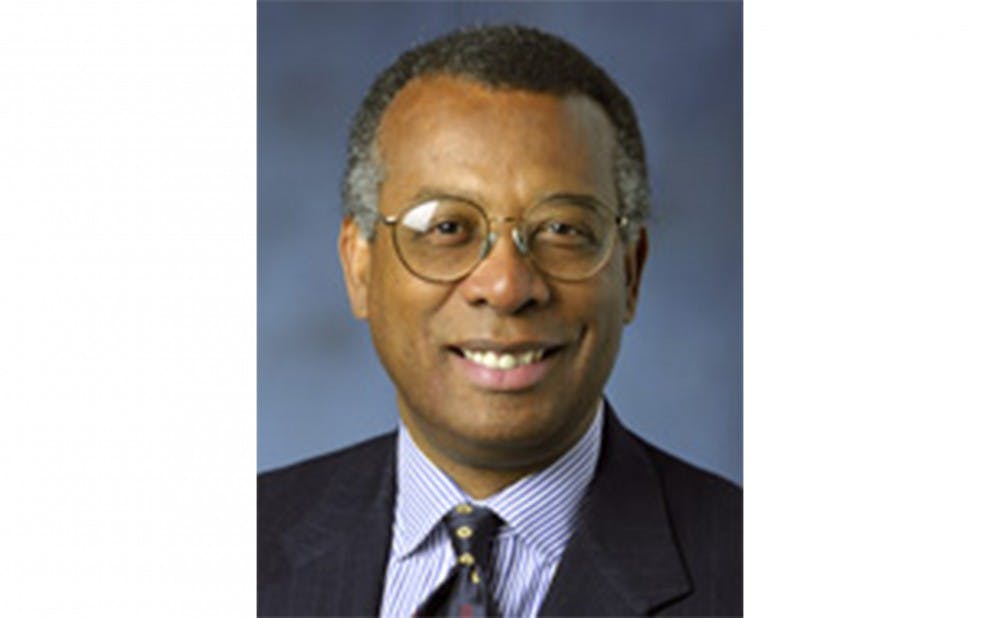Hearings for a lawsuit filed by a men's soccer player suspended for sexual assault continued Thursday with testimony from a professor.
Sophomore Ciaran McKenna, a member of the men's soccer team, filed a lawsuit against the University after he was suspended for six semesters when the Office of Student Conduct found he had violated Duke's sexual misconduct policy. He is alleging breach of contract, common-law fairness violations and negligence for what his lawsuit considers the University's flawed decision to try him twice for the same alleged assault.
James Coleman, John S. Bradway professor of the practice of law and faculty advisor to McKenna, testified both Wednesday and Thursday on McKenna's behalf. Coleman is co-director of the Wrongful Convictions Clinic at Duke and chaired the Lacrosse Ad Hoc Review Committee, which was convened by President Richard Brodhead during the 2006 Duke lacrosse scandal to investigate the behavior of the lacrosse team.
Paul Sun, an attorney for Duke, questioned Coleman for an hour. Although McKenna was present in court on Thursday, he did not testify.
Much of the hearing focused on the two panels Duke convened to evaluate the case.
The first three-person panel, convened in July 2016 by the Office of Student Conduct, found unanimously that McKenna was responsible for violating Duke’s sexual misconduct policy. It was facilitated by Leslie Grinage, former associate dean of students, according to court documents presented Thursday.
The panel was not unanimously convinced, however, that the alleged victim (who is also a student) said “no” to the sexual encounter, although she claimed that she had. But Duke’s policy still requires affirmative consent by words or by action. The panel concluded that although the victim did not say "no," she also did not verbally consent—making McKenna responsible for sexual misconduct.
McKenna—with the help of Coleman—appealed the decision, relying largely on the panel's finding that the alleged victim had not explicitly said "no" to the encounter. The University's student conduct policy guarantees the accused student the right to a trained advisor.
Coleman argued that the first panel’s finding that the alleged victim had not said "no" meant implicitly that her testimony was not credible.
“By rejecting her claim that she said 'no,' they also rejected the associated action that she claimed occurred,” he said in court.
The appeals panel found that there was procedural error in the first panel, which did not use the appropriate "reasonable person" standard to decide the case. The issue was then returned to the Office of Student Conduct to correct the procedural error. A second panel, convened in November 2016, found that not only had the alleged victim not given consent, but that she had also explicitly denied it.
McKenna alleges, and Coleman argued the same in his testimony, that remanding to an entirely new panel violated the University's student conduct policy. According to Coleman, the case should either have been settled by the appeals board or settled by the original panel, but not a new panel.
Sun asked Coleman if he thought it was double jeopardy for the case to be tried again. Double jeopardy is a provision in constitutional law saying that a defendant cannot be retried for the same crime more than once.
“It would be the equivalent of double jeopardy," Coleman said. "Obviously, Duke isn’t directly, in the Constitution, subject to the due process clause. But I think it’s generally accepted that administrative hearings are supposed to reflect fundamental due process, and I think that double jeopardy is a fundamental concept, inherent in the notion of administrative fairness.”
Coleman said that there "never should have been a second hearing panel." At the end of his testimony, he said that Duke had failed in its responsibility to be fair to students.
“Duke has said that it would be fair to all of its students. It has said that repeatedly and in numerous places,” Coleman said. “I thought it was in the University’s interest to hear what was going on in this case, and I hoped that they would intervene and correct the situation before further damage was done.”
Coleman said he went to Larry Moneta, vice president for student affairs, and Stephen Bryan, associate dean of students and director of the Office of Student Conduct, in hopes that they would correct an "error" to "avoid any damage to the plaintiff or to the University."
Substantial parts of Coleman's testimony also involved casting doubt on the alleged victim's credibility by questioning claims she allegedly made about being a virgin during the panel hearings. Coleman said there were other witnesses at the initial panel who claimed they had also had sex with the victim before this incident occurred. These students said when they had sex with the alleged victim, she had also said she was a virgin, which Coleman argued meant she was not credible.
“You believe that other student over her?” Sun asked Coleman, to which Coleman responded "yes." Sun argued that the alleged victim's prior testimony backed her claim, but Coleman disagreed.
“I believed [the other student witness] to be truthful,” Coleman said. “Therefore, assuming that he was truthful, that’s what I believed—that she could not be a virgin if he was telling the truth. And she did not dispute it at the hearing.”
Get The Chronicle straight to your inbox
Sign up for our weekly newsletter. Cancel at any time.
At the end of the questioning, Sun asked Coleman, "You maintain that the plaintiff is actually innocent of the charge?"
“I think he is, yes,” Coleman said.
Judge Orlando Hudson will continue to hear arguments on Monday.

